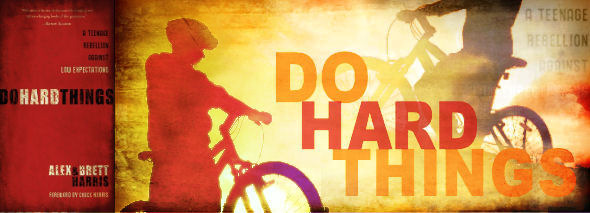
Singer-songwriter Brooke Fraser burst onto the music scene five years ago -- an unassuming, down-to-earth teenager who captivated the world with her ability to blend the hip, bold vogue of her generation with the honesty and vulnerability of one who is not afraid to express her emotions. Brooke's first album, What to Do with Daylight, was wildly popular -- not only among Christian audiences, despite its unmistakably spiritual leanings -- but also in the secular market, selling over 7 million copies around the world.
In 2006, after joining the worship group Hillsong and going on a life-changing visit to Africa, Brooke released Albertine: a sophomore effort that chronicles the lessons she has learned on her transition from adolescence to adulthood. Though the new album has enjoyed just as much success as its predecessor, I had never even heard of Brooke until earlier this year, and when I first listened to the CD, I instantly became aware of how much I had been missing. I've you're looking for an alternative to the superficial, shallow music that dominates today's radios, give Albertine a listen. Brooke's work is refreshingly thought-provoking and real; it will not only inspire you to draw closer to God, but it is also accessible enough to share with your non-Christian friends. The album's first track, Shadowfeet, showcases what is, in my mind, one of Brooke's greatest strengths as an artist: her ability to convey deeply meaningful lyrics through an approachable, contemporary musical medium. Opening with a nod to the transience of this world -- "walking, stumbling / on these shadow-feet / towards home..." -- the song reflects on the progressive change that God is working in his people as he prepares them for his return. Piano, drums, and electric guitar converge in a beautifully layered chorus, and Brooke's voice is audibly confident as she sings of trusting God on the final day: "When the world has fallen out from under me / I'll be found in You / still standing..." A beautiful opener where Biblically-inspired lyrical depth meet the youthful vibrancy of a catchy, fast-paced pop tune. Transitioning to a softer, more intimate atmosphere, Brooke proceeds to sing Deciphering Me. Laden with enigmatic imagery, the song holds a different meaning for every listener, but its overarching message is as clear as the unabashed praise in its chorus: "It's love that holds us / if we all walk in His light... Oh, did you see the stars colliding / shining just to show / we belong..." While most of Brooke's songs are sung in a low register, this track has many high notes -- vocal acrobatics that she performs unpretentiously, displaying (but not showing off) the wispy, ethereal quality of her upper range without ever taking the listener's attention off the lyrical content. Love, Where is Your Fire? follows; a slow and contemplative prayer that starts with a reflection on the lukewarm lifestyle, and evolves into a cry for a more passionate existence: "I want to blaze with You / and I'm holding my heart out to You." The song's accompaniment, a jazzy tapestry woven predominantly by guitar and drum, draws listeners in with an intensity that leaves them both convicted and inspired. As someone who bought the album several days before Valentine's Day, Love is Waiting was a highlight for me: a well-needed antidote to society's casual views on romance. The song isn't an abstinence sermon or a patriotic anthem for singles -- it's rather like a love poem, charming and honest, written to encourage a 'special someone' to avoid rushing love until "'we're ready / 'till it's right." Brooke married singer Scott Ligertwood about two years after the album's release, and this piece provides a beautiful glimpse into their approach to the relationship: one of humility, caution, and encouragement, rather than the mere adoration that most love songs portray. This track is a pleasure to listen to, and sets a great example for youth without being preachy in the least. In Albertine, the album's title track, Brooke focuses on a different kind of love: the love that has inspired her to sponsor three African children and tell millions of listeners about the lessons she learned on an eye-opening visit to the continent in 2005. While in Rwanda, Brooke met Albertine, a young survivor of the 1994 genocide that had ravaged her country and left her orphaned. Though it's been over a decade since the mass killings took place, Rwanda's scars are still fresh, and its poverty crisis, far from over. Following her visit, Brooke wrote a song to pass on Albertine's story to listeners in New Zealand and beyond: "I will tell the world / I will tell them where I've been ... I am on a stage / a thousand eyes on me / I will tell them, Albertine..." Backed by a hypnotic, rhythmic guitar pattern, Brooke boldly calls Christians to take action against the suffering: "Now that I have seen / I am responsible / Faith without deeds is dead." On the next track, C.S. Lewis Song, Brooke draws on ideas from the book Mere Christianity, musing over her purpose in life and searching Heaven for the answer to "desires [which] nothing in this world can satisfy." For all its gorgeous orchestration and appealing rock vibe, the song isn't an 'easy listen;' it's a probing, convicting track that compels listeners -- Christian and non-Christian alike -- to search for the "bigger picture" among the comforts of a superficial world. Unlike the edgy, moody C.S. Lewis Song, Faithful is a soft and joyful prayer that addresses one of the toughest situations that all Christians encounter: those times when they can't feel God's presence. Rather than creating a mood of desperation, Brooke sings with contentment and resolve: "When I can't feel You / I have learned to reach out just the same / When I can't hear You / I know you still hear every word I say." Though more laid-back than most of Brooke's songs are, this track is no less compelling, and it's the perfect song for days when God seems far away. Seeds is a simple, heartfelt song to future generations, whom Brooke promises "to teach ... the little I have learned so far." Vocally, I feel like it's not the strongest track on the album, but the tenderness and sincerity in her words makes it one of the Albertine's most touching gems. However, it is the next track -- Hosea's Wife -- which is my personal favourite. The song has an infectious melody and some of the most striking lyrics on the entire album, in which Brooke criticizes the world's faithless ways and calls people to "shed that shallow skin / come and live again..." The words are like poetry, reverberating with conviction and Biblical truth; the music is deliciously catchy. I'll give you fair warning: this is a song that's likely to get stuck in your head -- but it's certainly not a message you'll want to keep from your mind! Sung in a half-whisper and accompanied by a solitary guitar, Thief is an unlikely standout. In songs such as Shadowfeet and C.S. Lewis, Brooke's voice seems to have a slightly synthesized sound; there is none of that on Thief. The track's organic production reveals the raw emotion and hidden nuances of Brooke's voice that louder, rockier songs tend to hide. Here, she spins a beautiful love song, slow and subdued, to the man who "could be the thief / I give the key to" -- an excellent example of how simplicity and minimalism can sometimes be the best channel for expressing one's feelings. In a similar vein, the album closes with Hymn, a piano-based piece written in traditional hymn style (with the Thou's and Thee's). This is very unusual for a contemporary disc, but it closes the album beautifully by bringing the listener's attention back to the reason behind Brooke's music: "If my life has one ambition / if my soul one goal to seek / This my solitary vision ... that I only dwell in Thee..." Article by Oksana K. [Editor]
Article by Oksana K. [Editor]
Image credits: Jeremy Cowart; Albertine CD cover.
Hear more Brooke: on Myspace
















0 comments
Post a Comment